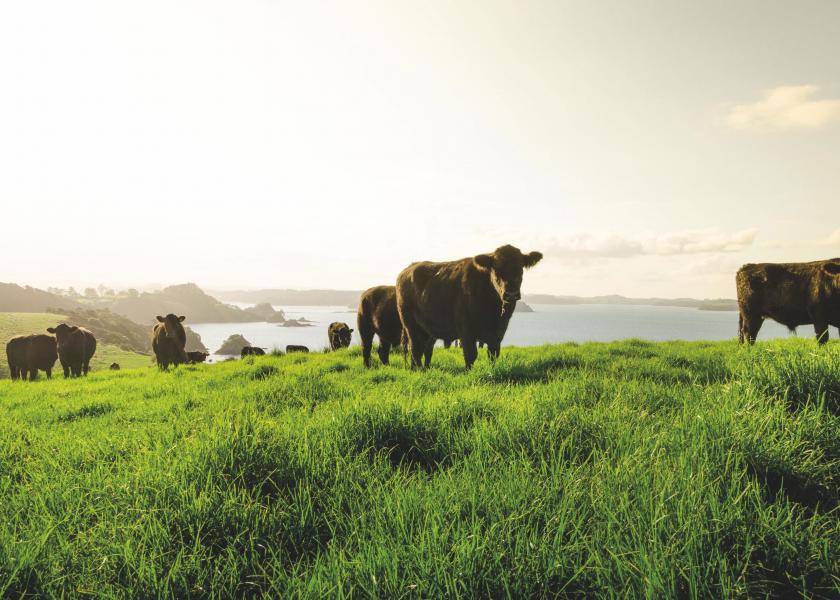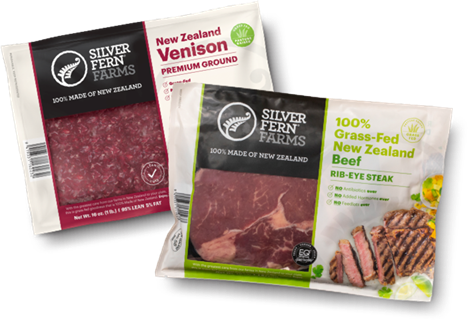New Zealand Company Offers Net Carbon Zero Angus Beef

Capitalizing on growing demand for products that are more environmentally “friendly,” a New Zealand company began offering USDA-approved Net Carbon Zero Angus beef in the U.S. in March.
Silver Fern Farms, New Zealand’s largest red meat producer which exports to 60 countries, says its ‘Net Carbon Zero By Nature’ product is another step toward becoming climate positive and regenerative by 2030. Silver Fern Farms has supplied the U.S. market with its grass-fed product for four decades.
Silver Fern Farms says its unique approach utilizes “insetting,” which means the carbon credits needed to offset the emissions of the product are found by working with farmers to optimize the role that the farms, where the animals are raised, can play in acting as carbon sinks, rather than having to rely on purchasing carbon credits from other projects. Satellite mapping and AI technology has been deployed to measure on-farm vegetation.
“Taking care of our emissions is our own responsibility, no-one else’s,” says Silver Fern Farms CEO Simon Limmer. “We are not outsourcing our emissions, rather we are recognizing and incentivizing our farmers for their efforts to create farm environments that are better able to capture carbon, increase biodiversity and support nature positive food production.”
Beginning the first week of March, American shoppers at 75 supermarkets in New York and selected markets in Los Angeles could purchase Net Carbon Zero By Nature branded Angus Rib-Eye and New York Strip steaks, ground beef and other cut.
Simon Limmer says that U.S. consumers and its own New Zealand cooperative farmers are more conscious than ever of the environment in which their food is raised. “In New Zealand we have a deep connection to nature and caring for the environment is part of who we are. With our Net Carbon Zero range we want to show we can produce great tasting red meat in way that is better for the planet.”

Recognizing that 96% of beef emissions occur on farm, in 2018 Silver Fern Farms commenced a program to map and measure the sequestration potential from the many types of vegetation present on New Zealand farms.
Satellite technology, aided by increasingly sophisticated AI software, has been used to measure on-farm vegetation to within 0.5 of a meter, enabling a calculation of each individual farm’s ability to sequester carbon. The on-farm vegetation includes woodlot forests, shelter belts, regenerating native bush, summer shade and winter animal shelter, erosion, and riparian planting.
New Zealand’s premier agricultural science institution Ag Research has supported the product certification, and the product is fully certified as Net Carbon Zero by New Zealand’s most trusted environmental verification body, Toitū Envirocare.
“The commitment by our farmers to whole-of-farm accountability is real, it runs deep,” says Limmer. “In the last couple of years many farmers have been tracking and managing emissions on their farms and in October over 1000 Silver Fern Farm farmers attended workshops in every part of New Zealand to calculate their emissions and move towards having emissions management plans.”
“Through our Net Carbon Zero program we are connecting our hardworking farmers with customers who want to support them to plant, restore, and regenerate vegetation to increase the amount of carbon their farms can naturally remove from the atmosphere. That’s pretty exciting” says Limmer.
Silver Fern Farms says the Net Carbon Zero By Nature Angus steaks and ground beef will have exactly the same bold, nutrient dense, and unmatched texture of its 100% grass-fed suite of meat cuts. “Nothing has changed in terms of our famous 100% grass-fed taste profile,” says Limmer. “All of our cattle browse outside in nature all year-round on a diverse diet of rich clover and rye grasses, on farms that can increasingly offset the emissions they produce. This is truly beef made better.”
Silver Fern Farms says it aims to play a global leadership role in driving sustainability in the red meat sector and is working to reduce greenhouse gas emissions across the company’s value chain. The company has a 1.5 degree science aligned target to reduce processing emissions by 42% by 2030 (from a 2020 base year) and is leading the red meat sector by having joined the International Science Based Targets initiative (SBTi).
“Down here in New Zealand, we believe we could just have the kinds of farms the world is waiting for,” says Limmer. “We look forward to sharing Net Carbon Zero by Nature with our customers and taking another a step together towards a nature positive future.”







